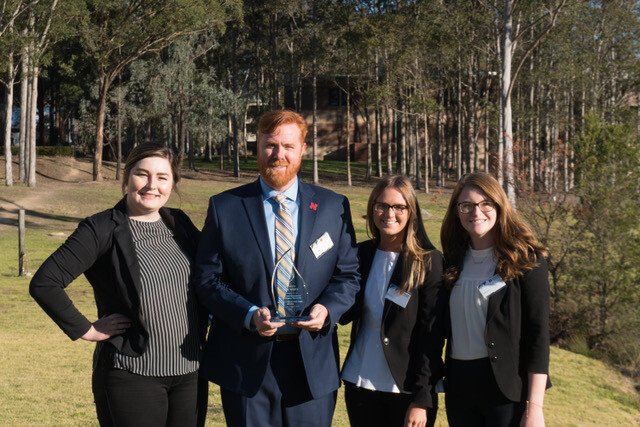
Husker graduates of the University of Nebraska-Lincoln’s National Security Studies program are finding limitless opportunity in the echelons of national intelligence and homeland security.
In fact, the success of Nebraska students is unparalleled in the Big Ten Conference and beyond, said Tyler White, interim director of the program and assistant professor of practice in political science.
“Sometimes, part of our job is convincing students that they can do this.”
— Tyler White, interim director, National Security Studies program
“Hiring officials with the agencies have told us that they typically receive more than 100,000 applications a year for a few hundred open positions,” White said. “In the last two application cycles, more than 50 percent of our IC graduates have received a conditional offer of employment.
“We’re developing a bit of a reputation for sending students who are smart but also have a really good work ethic. I’m not saying that because I think our students are great; I’m saying that because I’ve had people in the intelligence community tell me that.”
Nebraska garnered international attention, too, when White earned the International Association for Intelligence Education’s Instructor of the Year award in July.
The program got its start in 2009, when the university was selected as an Intelligence Community Center for Academic Excellence by the U.S. Office of the Director of National Intelligence. This allowed Nebraska to set up the Intelligence Community Scholars program that year and to add the interdisciplinary national security studies minor in 2011.
Now, National Security Studies also includes opportunities to participate in intelligence research teams, National Security Club, and the Deterrence and Assurance Academic Alliance with U.S. Strategic Command. Most of the learning experience happens outside a traditional classroom.
“Every component helps them develop a resume that makes them hirable,” White said.
Abby Garden, a global studies major, said the insight and skills learned through the program have made pursuing a career in national security less daunting.
“Breaking into such a field is incredibly difficult, and without proper mentorship and guidance, it’s easy to become lost in the shuffle,” the senior from Kearney said. “IC Scholars provides a community for students at Nebraska to get the tools that will make them more competitive and better public servants.“
White and founding director Marc Warburton have strengthened the mentorship component by establishing relationships with career intelligence officials and inviting them to work with the students as often as possible.
“Sometimes, part of our job is convincing students that they can do this,” White said. “The intelligence community is a really mysterious thing — somewhat by design — and students don’t know that they can have a career there. It’s important to talk to the practitioners — the ones in the field day-to-day.”

Jenna Vigal described her participation in the various activities and classes as “career mentoring in all aspects.” The junior from Omaha applied for IC Scholars after learning about it through her political science and global studies majors, enrolling when she began considering a career with the Department of State.
“(IC Scholars) really gives you exposure and knowledge,” she said. “There are so many ways and opportunities to participate. You keep exploring, and you find your specialty.”
Vigal, who also minors in National Security Studies, harnessed that knowledge and opportunity to earn an internship at the U.S. Embassy in Riga, Latvia. She’ll complete the internship during the spring 2019 semester.
More and more students like Vigal are learning about National Security Studies, White said.
“It’s grown well beyond our expectations,” he said. “When the minor was introduced in 2011, there were 12 students. Now, there are 145.
“The challenge now is managing that growth and determining what the future of the program looks like.”







